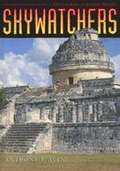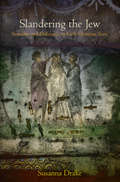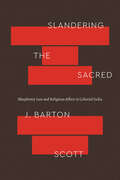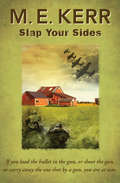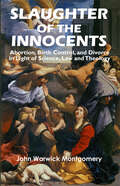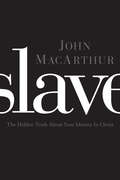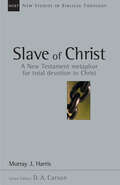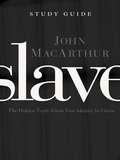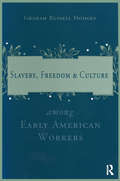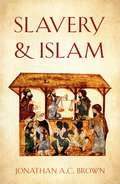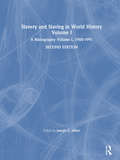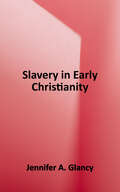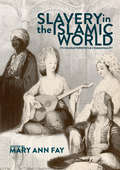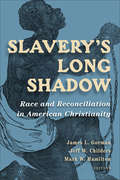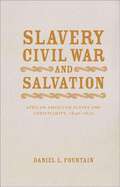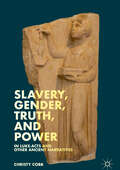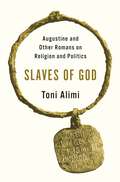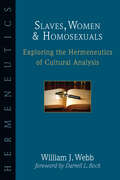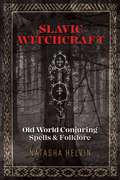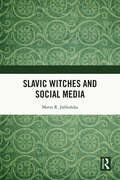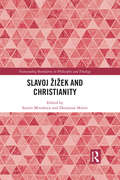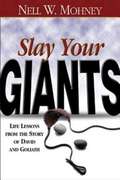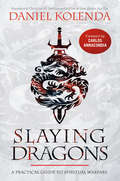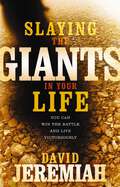- Table View
- List View
Skywatchers: A Revised And Updated Version Of Skywatchers Of Ancient Mexico
by Anthony F. AveniSkywatchers of Ancient Mexico helped establish the field of archaeoastronomy, and it remains the standard introduction to this subject. Combining basic astronomy with archaeological and ethnological data, it presented a readable and entertaining synthesis of all that was known of ancient astronomy in the western hemisphere as of 1980.
Slandering the Jew: Sexuality and Difference in Early Christian Texts (Divinations: Rereading Late Ancient Religion)
by Susanna DrakeAs Christian leaders in the first through fifth centuries embraced ascetic interpretations of the Bible and practices of sexual renunciation, sexual slander—such as the accusations Paul leveled against wayward Gentiles in the New Testament—played a pivotal role in the formation of early Christian identity. In particular, the imagined construct of the lascivious, literal-minded Jew served as a convenient foil to the chaste Christian ideal. Susanna Drake examines representations of Jewish sexuality in early Christian writings that use accusations of carnality, fleshliness, bestiality, and licentiousness as strategies to differentiate the "spiritual" Christian from the "carnal" Jew. Church fathers such as Justin Martyr, Hippolytus of Rome, Origen of Alexandria, and John Chrysostom portrayed Jewish men variously as dangerously hypersexual, at times literally seducing virtuous Christians into heresy, or as weak and effeminate, unable to control bodily impulses or govern their wives.As Drake shows, these carnal caricatures served not only to emphasize religious difference between Christians and Jews but also to justify increased legal constraints and violent acts against Jews as the interests of Christian leaders began to dovetail with the interests of the empire. Placing Christian representations of Jews at the root of the destruction of synagogues and mobbing of Jewish communities in the late fourth and early fifth centuries, Slandering the Jew casts new light on the intersections of sexuality, violence, representation, and religious identity.
Slandering the Sacred: Blasphemy Law and Religious Affect in Colonial India (Class 200: New Studies in Religion)
by J. Barton ScottA history of global secularism and political feeling through colonial blasphemy law. Why is religion today so often associated with giving and taking offense? To answer this question, Slandering the Sacred invites us to consider how colonial infrastructures shaped our globalized world. Through the origin and afterlives of a 1927 British imperial law (Section 295A of the Indian Penal Code), J. Barton Scott weaves a globe-trotting narrative about secularism, empire, insult, and outrage. Decentering white martyrs to free thought, his story calls for new histories of blasphemy that return these thinkers to their imperial context, dismantle the cultural boundaries of the West, and transgress the borders between the secular and the sacred as well as the public and the private.
Slap Your Sides
by M. E. KerrWorld War II comes to a small Pennsylvania town in this thought-provoking novel about a peace-loving Quaker family War may be raging in Europe, but in Sweet Creek, Pennsylvania, peace is being waged. Bud Shoemaker is vehemently opposed to the war when he registers for the draft as a conscientious objector. No one except his Quaker family shares Bud&’s pacifist views—although his thirteen-year-old brother, Jubal, wonders what kind of Quaker he&’ll be when it comes time for him to enlist. Jubal loves and believes in his brother, even if the whole town—including Daria Daniel, the girl Jubal secretly loves—doesn&’t.With everyone calling Bud a coward, Jubal&’s family is slowly being torn apart. But when an unexpected, vicious act forces Jubal to grapple with man&’s penchant for violence, he has to grow up fast in a community in which killing becomes the measure of a man.Slap Your Sides is a riveting tale of courage and conscience that delivers a timeless, universal message about what makes a hero and what it really means to be a patriot.This ebook features an illustrated personal history of M. E. Kerr including rare images from the author&’s collection.
Slaughter of the Innocents: Abortion, Birth Control, & Divorce in Light of Science, Law & Theology
by John Warwick MontgomeryDr. Montgomery examines some of the most tragic and divisive issues facing Christians today—abortion, divorce, and birth control. Drawing from a wealth of knowledge and reflection on the moral, ethical, theological, medical, and legal aspects of his topics, Dr. Montgomery sheds new and invaluable light on the issues.
Slave
by John MacarthurA COVER-UP OF BIBLICAL PROPORTIONS... Centuries ago, English translators perpetrated a fraud in the New Testament, and it's been purposely hidden and covered up ever since. Your own Bible is probably included in the cover-up! In this book, John MacArthur unveils the essential and clarifying revelation that may be keeping you from a fulfilling--and correct--relationship with God. It's powerful. It's controversial. And with new eyes you'll see the riches of your salvation in a radically new way. What does it mean to be a Christian the way Jesus defined it? MacArthur says it all boils down to one word: SLAVE "We have been bought with a price. We belong to Christ. We are His own possession." Endorsements: "Dr. John MacArthur is never afraid to tell the truth and in this book he does just that. The Christian's great privilege is to be the slave of Christ. Dr. MacArthur makes it clear that this is one of the Bible's most succinct ways of describing our discipleship. This is a powerful exposition of Scripture, a convincing corrective to shallow Christianity, a masterful work of pastoral encouragement...a devotional classic." ?Dr. R. Albert Mohler, President, The Southern Baptist Theological Seminary "John MacArthur expertly and lucidly explains that Jesus frees us from bondage into a royal slavery that we might be His possession. Those who would be His children must, paradoxically, be willing to be His slaves." ?Dr. R.C. Sproul "Dr. John MacArthur's teaching on 'slavery' resonates in the deepest recesses of my 'inner-man.' As an African-American pastor, I have been there. That is why the thought of someone writing about slavery as being a 'God-send' was the most ludicrous, unconscionable thing that I could have ever imagined...until I read this book. Now I see that becoming a slave is a biblical command, completely redefining the idea of freedom in Christ. I don't want to simply be a 'follower' or even just a 'servant'...but a 'slave'." ?The Rev. Dr. Dallas H. Wilson, Jr., Vicar, St. John's Episcopal Chapel, Charleston, SC
Slave and Citizen: The Life of Frederick Douglass
by Nathan Irvin HugginsBy 1841, many Bostonians and some New Englanders in other parts of the United States had become abolitionists. They considered the South's peculiar institution incompatible with the republican nature of their country.
Slave of Christ: A New Testament Metaphor for Total Devotion to Christ (New Studies in Biblical Theology #Volume 8)
by Murray J. HarrisThe New Testament finds many ways to depict the relationship of Christians and their Lord. They are his disciples, sons, daughters and friends. But it is perhaps too little recognized that they are also his slaves. In this New Studies in Biblical Theology volume, Murray J. Harris sets out to uncover what it means to be a slave of Christ. He begins by assessing the nature of actual slavery in the Greco-Roman world and the New Testament's attitude towards it. Drawing insights from this, he goes on to unfold the metaphor of slavery to Christ. Among the topics discussed are slavery and spiritual freedom, lordship, ownership, and privilege. Slave of Christ is a model of good biblical theology, providing insights both for future study of the Bible and for practical application. Addressing key issues in biblical theology, the works comprising New Studies in Biblical Theology are creative attempts to help Christians better understand their Bibles. The NSBT series is edited by D. A. Carson, aiming to simultaneously instruct and to edify, to interact with current scholarship and to point the way ahead.
Slave the Study Guide
by John MacarthurWHAT DOES IT MEAN TO BE A CHRISTIAN THE WAY FIRST-CENTURY BELIEVERS DEFINED IT?As followers of Jesus, we call ourselves "Christians," but the fact is this word only appears three times in the Bible. In the New Testament, you'll find a host of terms that identify the followers of Jesus, but there is one metaphor used more frequently than any other. Slave.That's right. The first Christians, having been galvanized by the words of Jesus, gave up everything and called themselves slaves of Christ. Now you can learn why this word best described early Christ-followers--and you'll see how an understanding of this truth changes the way to follow Him now. This discovery will unveil the riches of your salvation in a radically new way.Now you or your group can use this study guide to drill down through each major concept in Dr. John MacArthur's remarkable book Slave:REWIND. Look again at the important passages.RETHINK. Check all the angles.REFLECT. Consider how it affects you.REACT. Change your life.The gospel is not simply an invitation to become Christ's associate or friend--it is a mandate to become His slave.Endorsements:"John MacArthur expertly and lucidly explains that Jesus frees us from bondage into a royal slavery that we might be His possession. Those who would be His children must, paradoxically, be willing to be His slaves." --DR. R.C. SPROUL"In this new book, John MacArthur presents a powerfully riveting and truly eye-opening look at our relationship to the Lord Jesus. Want to rise to a new level of trust and confidence in your Master? Then this is the book for you!" --JONI EARECKSON TADA, Joni and Friends International Disability Center"Dr. John MacArthur's teaching on 'slavery' resonates in the deepest recesses of my 'inner-man'. As an African-American pastor, I have been there. That is why the thought of someone writing about slavery as being a 'God-send' was the most ludicrous, unconscionable thing that I could have ever imagined . . . until I read this book. Now I see that becoming a slave is a biblical command, completely redefining the idea of freedom in Christ. I don't want to simply be a 'follower' or even just a 'servant' . . . but a 'slave'." --THE REV. DR. DALLAS H. WILSON, JR., Vicar, St. John's Episcopal Chapel, Charleston, South Carolina
Slavery and Freedom Among Early American Workers
by Graham Russell HodgesCovering a chronological span from the seventeenth century to the Civil War, the book reunites black and labor history, including such major topics as the formation of slavery in the North, the American Revolution, blacks and the Workingmen's Movement, and interracial marriage before the Civil War. This book provides fascinating reading for students of American history, labor history, urban history, and black history.
Slavery and Islam
by Jonathan A.C. BrownWhat happens when authorities you venerate condone something you know is wrong? Every major religion and philosophy once condoned or approved of slavery, but in modern times nothing is seen as more evil. Americans confront this crisis of authority when they erect statues of Founding Fathers who slept with their slaves. And Muslims faced it when ISIS revived sex-slavery, justifying it with verses from the Quran and the practice of Muhammad. Exploring the moral and ultimately theological problem of slavery, Jonathan A.C. Brown traces how the Christian, Jewish and Islamic traditions have tried to reconcile modern moral certainties with the infallibility of God&’s message. He lays out how Islam viewed slavery in theory, and the reality of how it was practiced across Islamic civilization. Finally, Brown carefully examines arguments put forward by Muslims for the abolition of slavery. CONTENTS Preface Acknowledgments Notes on transliteration, dates and citationIntroduction: Can We Talk About Slavery? What I Argue in this Book Apology for Slavery? Power and the Study of Slavery Blackness, Whiteness and Slavery 1. Does &‘Slavery&’ Exist? The Problem of Definition The Main Argument Definition: A Creative Process Definition to Discourse: A Political Process Defining \ˈslā-v(ə-)rē\: We Know It When We See It Defining Slavery as Status or a Condition Slavery as Unfreedom Slavery as Human Property Patterson & Natal Alienation Slavery as Distinction: The Lowest Rung & Marginality Slavery as Coercion & Exploitation under the Threat of Violence The Problem with Modern-Day Slavery Slavery & Islam – A Very Political Question Conclusion: Of Course, Slavery Exists The Proper Terms for Speaking about &‘Slavery&’ 2. Slavery in the Shariah What Islam Says about Slavery – Ideals and Reality Slavery in the Quran & Sunna Inheriting the Near East – Roman, Jewish and Near Eastern Laws versus Islam Islam&’s Reform of Slavery Basic Principles of Riqq in the Shariah The Ambiguities of Slavery in the Shariah Riqq & Rights in the Shariah Religious Practice Freedom of Movement Social and Political Roles Marriage and Family Life Right to Property Rights to Life and Physical Protection Summary: Law and Ethics 3. Slavery in Islamic Civilization What is Islamic Civilization? Is there &‘Islamic Slavery&’? The Shariah & Islamic Slavery Muslims Enslaving Muslims The Classic Slavery Zone Consuming People & &‘Ascending Miscegenation&’ Slave Populations Routes of the Muslim Slave Trade Blackness and Slavery in Islamic Civilization The Roles and Experiences of Slaves in Islamic Civilization The Slave as Uprooted Person and Commodity The Slave as Domestic Labor . . . Even Trusted Member of a Household Slave as Sexual Partner Slave as Saint, Scholar or Poet Slave as Elite Administrator & Courtesan Slave as Soldier – When Soldiers often Ruled Slave as Rebel 4. The Slavery Conundrum No Squaring the Circle: The American/Islamic Slavery Conundrum Slavery is Evil The Intrinsic Wrongs of Slavery Religions and Slavery Minimizing the Unminimizable or Historicizing the Unhistoricizable Slavery is Slavery: The Problem of Labeling &‘Slavery&’ with One Moral Judgment The Moral Wrongness of Slavery as Unfreedom The Moral Wrongness of Slavery as Owning Human Property<
Slavery and Slaving in World History: A Bibliography, 1900-91
by David Y MillerThis bibliography of 20th century literature focuses on slavery and slave-trading from ancient times through the 19th century. It contains over 10,000 entries, with the principal sections organizing works by the political/geographical frameworks of the enslavers.
Slavery in Early Christianity
by Jennifer A. GlancyThis is the first paperback edition of the enlightening Oxford University hardcover published in 2002. Glancy here situates early Christian slavery in its broader cultural setting, arguing that modern scholars have consistently underestimated the pervasive impact of slavery on the institutional structures, ideologies, and practices of the early churches - and upon the bodies of the enslaved. Her careful attention to the bodily experience of subjection and violation that constituted slavery makes this an indispensable book for anyone interested in slavery in early Christianity. Includes special chapters on Jesus and Paul.
Slavery in the Islamic World: Its Characteristics and Commonality
by Mary Ann FayThis edited volume determines where slavery in the Islamic world fits within the global history of slavery and the various models that have been developed to analyze it. To that end, the authors focus on a question about Islamic slavery that has frequently been asked but not answered satisfactorily, namely, what is Islamic about slavery in the Islamic world. Through the fields of history, sociology, literature, women's studies, African studies, and comparative slavery studies, this book is an important contribution to the scholarly research on slavery in the Islamic lands, which continues to be understudied and under-represented in global slavery studies.
Slavery's Long Shadow: Race and Reconciliation in American Christianity
by James L. Gorman Jeff W. Childers Mark W. HamiltonHow interactions of race and religion have influenced unity and division in the church At the center of the story of American Christianity lies an integral connection between race relations and Christian unity. Despite claims that Jesus Christ transcends all racial barriers, the most segregated hour in America is still Sunday mornings when Christians gather for worship. In Slavery’s Long Shadow fourteen historians and other scholars examine how the sobering historical realities of race relations and Christianity have created both unity and division within American churches from the 1790s into the twenty-first century. The book’s three sections offer readers three different entry points into the conversation: major historical periods, case studies, and ways forward. Historians as well as Christians interested in racial reconciliation will find in this book both help for understanding the problem and hope for building a better future.Contributors:Tanya Smith BriceJoel A. BrownLawrence A. Q. BurnleyJeff W. ChildersWes CrawfordJames L. GormanRichard T. HughesLoretta HunnicuttChristopher R. HutsonKathy PulleyEdward J. RobinsonKamilah Hall SharpJerry TaylorD. Newell Williams
Slavery, Civil War, and Salvation: African American Slaves and Christianity, 1830-1870 (Conflicting Worlds: New Dimensions of the American Civil War)
by Daniel L. FountainDuring the Civil War, traditional history tells us, Afro-Christianity proved a strong force for slaves' perseverance and hope of deliverance. In Slavery, Civil War, and Salvation, however, Daniel Fountain raises the possibility that Afro-Christianity played a less significant role within the antebellum slave community than most scholars currently assert. Bolstering his argument with a quantitative survey of religious behavior and WPA slave narratives, Fountain presents a new timeline for the African American conversion experience.Both the survey and the narratives reveal that fewer than 40 percent of individuals who gave a datable conversion experience had become Christians prior to acquiring freedom. Fountain pairs the survey results with an in-depth examination of the obstacles within the slaves' religious landscape that made conversion more difficult if not altogether unlikely, including infrequent access to religious instruction, the inconsistent Christian message offered to slaves, and the slaves' evolving religious identity. Furthermore, he provides other possible explanations for beliefs that on the surface resembled Christianity but in fact adhered to traditional African religions. Fountain maintains that only after emancipation and the fulfillment of the predicted Christian deliverance did African Americans more consistently turn to Christianity. Freedom, Fountain contends, brought most former slaves into the Christian faith. Provocative and enlightening, Slavery, Civil War, and Salvation redefines the role of Christianity within the slave community.
Slavery, Gender, Truth, and Power in Luke-Acts and Other Ancient Narratives
by Christy CobbThis book examines slavery and gender through a feminist reading of narratives including female slaves in the Gospel of Luke, the Acts of the Apostles, and early Christian texts. Through the literary theory of Mikhail Bakhtin, the voices of three enslaved female characters—the female slave who questions Peter in Luke 22, Rhoda in Acts 12, and the prophesying slave of Acts 16—are placed into dialogue with female slaves found in the Apocryphal Acts, ancient novels, classical texts, and images of enslaved women on funerary monuments. Although ancients typically distrusted the words of slaves, Christy Cobb argues that female slaves in Luke-Acts speak truth to power, even though their gender and status suggest that they cannot. In this Bakhtinian reading, female slaves become truth-tellers and their words confirm aspects of Lukan theology. This exegetical, theoretical, and interdisciplinary book is a substantial contribution to conversations about women and slaves in Luke-Acts and early Christian literature.
Slaves of God: Augustine and Other Romans on Religion and Politics
by Toni AlimiA provocative look at the central role of slavery in Augustine&’s religious, ethical, and political thoughtAugustine believed that slavery is permissible, but to understand why, we must situate him in his late antique Roman intellectual context. Slaves of God provides a major reassessment of this monumental figure in the Western religious and political tradition, tracing the remarkably close connections between Augustine&’s understanding of slavery and his broader thought.Augustine is most often read through the lens of Greek philosophy and the theology of Christian writers such as Paul and Ambrose, yet his debt to Roman thought is seldom appreciated. Toni Alimi reminds us that the author of Confessions and City of God was also a Roman citizen and argues that some of the thinkers who most significantly shaped his intellectual development were Romans such as Cicero, Seneca, Lactantius, and Varro—Romans who had much to say about slavery and its relationship to civic life. Alimi shows how Augustine, a keen and influential student of these figures, related chattel slavery and slavery to God, and sheds light on Augustinianism&’s complicity in Christianity&’s long entanglement with slavery.An illuminating work of scholarship, Slaves of God reveals how slavery was integral to Augustine&’s views about law, rule, accountability, and citizenship, and breaks new ground on the topic of slavery in late antique and medieval political thought.
Slaves, Women and Homosexuals: Exploring the Hermeneutics of Cultural Analysis
by William J. WebbIn Slaves, Women Homosexuals William J. Webb tackles some of the most complex and controversial issues that have challenged the Christian church--and still do. He leads you through the maze of interpretation that has historically surrounded understanding of slaves, women and homosexuals, and he evaluates various approaches to these and other biblical-ethical teachings. Throughout, Webb attempts to "work out the hermeneutics involved in distinguishing that which is merely cultural in Scripture from that which is timeless" (Craig A. Evans). By the conclusion, Webb has introduced and developed a "redemptive hermeneutic" that can be applied to many issues that cause similar dilemmas. Darrel L. Bock writes in the foreword to Webb's work, "His goal is not only to discuss how these groups are to be seen in light of Scriptures but to make a case for a specific hermeneutical approach to reading these texts. . . . This book not only advances a discussion of the topics, but it also takes a markedly new direction toward establishing common ground where possible, potentially breaking down certain walls of hostility within the evangelical community."
Slavic Witchcraft: Old World Conjuring Spells and Folklore
by Natasha HelvinA practical guide to the ancient magical tradition of Russian sorcery and Eastern Slavic magical rites • Offers step-by-step instructions for more than 300 spells, incantations, charms, amulets, and practical rituals for love, career success, protection, healing, divination, communicating with spirits and ancestors, and other challenges and situations • Reveals specific places of magical power in the natural world as well as the profound power of graveyards and churches for casting spells • Explores the folk history of this ancient magical tradition, including how the pagan gods gained new life as Eastern Orthodox saints, and shares folktales of magical beings, including sorceresses shapeshifting into animals and household objects Passed down through generations, the Slavic practice of magic, witchcraft, and sorcery is still alive and well in Russia, the Ukraine, and Belarus, as well as the Balkans and the Baltic states. There are still witches who whisper upon tied knots to curse or heal, sorceresses who shapeshift into animals or household objects, magicians who cast spells for love or good fortune, and common folk who seek their aid for daily problems big and small. Sharing the extensive knowledge she inherited from her mother and grandmother, including spells of the “Old Believers” previously unknown to outsiders, Natasha Helvin explores in detail the folk history and practice of Russian sorcery and Eastern Slavic magical rites, offering a rich compendium of more than 300 spells, incantations, charms, and practical rituals for love, relationships, career success, protection, healing, divination, averting the evil eye, communicating with spirits and ancestors, and a host of other life challenges and daily situations, with complete step-by-step instructions to ensure your magical goals are realized. She explains how this tradition has only a thin Christian veneer over its pagan origins and how the Slavic pagan gods and goddesses acquired new lives as the saints of the Eastern Orthodox Church. She details how the magical energy for these spells and rituals is drawn from the forces of nature, revealing specific places of power in the natural world as well as the profound power of graveyards and churches for casting spells. She explores the creation of amulets and talismans, the importance of icons, and the proper recital of magical language and actions during spells, as well as how one becomes a witch or sorceress. Offering a close examination of these two-thousand-year-old occult practices, Helvin also includes Slavic folk advice, adapted for the modern era. Revealing what it means to be a Slavic witch or sorceress, and how this vocation pervades all aspects of life, she shows that each of us has magic within that we can use to take control of our own destiny.
Slavic Witches and Social Media
by Marta R. JabłońskaSlavic Witches and Social Media examines the role of social media in the spiritual practices of modern Slavic witches and draws a comparative analysis between contemporary neopaganism and Catholicism in Poland. This volume presents a fresh and comprehensive examination of Slavic witches within the context of the growing popularity of neopagan religions and the integration of social media in religious practices. It delves into contemporary witchcraft in Poland, including the prominent Wicca tradition, native Slavic beliefs with their diverse pantheon of deities, extensive demonology, and profound respect for nature, as well as individual, eclectic paths. Through a digital religion study, this book investigates how neopagans and Catholics incorporate social media into their spiritual journeys. Its vivid portrait of a Slavic witch provides a deeper understanding of their beliefs, practices, and engagement with social media platforms. This book is dedicated to scholars in the field of religious sociology, digital religion, and ethnography with a deep fascination for exploring folk magic and Slavic traditions and their adaptation to the emerging digital landscape. It is an insightful resource for researchers in theology, communication, and new media, as well as for all researchers and individuals who share an interest in the captivating realm of contemporary witches and witchcraft.
Slavoj Žižek and Christianity (Transcending Boundaries in Philosophy and Theology)
by Sotiris Mitralexis Dionysios SklirisSlavoj Žižek’s critical engagement with Christian theology goes much further than his seminal The Fragile Absolute (2000), or his The Puppet and the Dwarf (2003), or even his discussion with noted theologian John Milbank in The Monstrosity of Christ (2009). His reading of Christianity, utilising his signature elements of Lacanian psychoanalysis and Hegelian philosophy with modern philosophical currents, can be seen as a genuinely original contribution to the philosophy of religion. This book focuses on these aspects of Žižek’s thought with either philosophy and cultural theory, or Christian theology, serving as starting points of enquiry. Written by a panel of international contributors, each chapter teases out various strands of Žižek’s thought concerning Christianity and religion and brings them into a wider conversation about the nature of faith. These essays show that far from being an outright rejection of Christian thought and intellectual heritage, Žižek’s work could be seen as a perverse affirmation thereof. Thus, what he has to say should be of direct interest to Christian theology itself. Touching on thinkers such as Badiou, Lacan, Chesterton and Schelling, this collection is a dynamic reading and re-reading of Žižek’s relationship to Christianity. As such, scholars of theology, the philosophy of religion and Žižek more generally will all find this book to be of great interest.
Slay Your Giants: Life Lessons from the Story of David and Goliath
by Nell W. MohneyThis book by popular author Nell W. Mohney, draws from the biblical story of David and Goliath, offering readers inspiration and encouragement for facing and defeating the spiritual "giants" in their lives such as: grief, depression, procrastination, stress, perfectionism, anger and resentment, jealousy, lust, and loneliness. Questions are provided at the end of each chapter to help individuals and groups "dig a little deeper."
Slaying Dragons: A Practical Guide to Spiritual Warfare
by Daniel KolendaThe real fight is the one you can't see. The supernatural realm is very real, and it directly impacts our day-to-day lives. Often spiritual battles lie behind our everyday struggles. Though the spiritual world is invisible, we are not unaware of the enemy&’s schemes. Through God&’s Word and the power of the Holy Spirit we are equipped to be more than conquerors through Christ! With doctrinally sound, practical teaching, Slaying Dragons shows how the demonic realm fits into orthodox thoughts on salvation, redemption, and kingdom life. Daniel Kolenda demystifies spiritual warfare to shine light on what the enemy is doing in readers&’ lives and what they can do to slay every dragon they encounter. It also contains real-world examples of encounters with spiritual darkness, demonstrating examples of how &“the light shines in the darkness, and the darkness has not overcome it&” (John 1:5, NIV). It&’s easy to lose sight of the big picture as we focus on our everyday struggles. But our daily battles are part of a much bigger war, and we have been given all we need to win. Slaying Dragons will show readers what the enemy is trying to accomplish and how they can slay every dragon they encounter—in their lives and in the world.This book will teach you to see and overcome the spiritual battles behind your everyday struggles. Also Available in Spanish ISBN: 978-1-62999-283-9Other Books by Daniel Kolenda:Live Before You Die (2013) ISBN: 978-1616387167
Slaying the Giants in Your Life: You Can Win the Battle and Live Victoriously
by Dr. David JeremiahFight fear, destroy discouragement, win against worry, and disarm your doubts.The Bible warns us of "giants in the land," and whether they're literal like Goliath or figurative like fear, loneliness, and temptation, their goal is the same: to crush God's people. Beloved Bible teacher and pastor Dr. David Jeremiah shows you how to stand up to these bullies and win—with God's help!Whichever giant is intimidating you, the message of Slaying the Giants in Your Life is that God has the strength to bring you victory. You never walk alone and never have to live defeated. Learn to:Fight your fearDestroy your discouragementLiberate yourself from lonelinessWin against worryGuard against guiltResist your resentmentThese are daunting giants, but thankfully you have access to God&’s Word, which is a wealth of knowledge, encouragement, and power. With God on your side, you never walk alone or in weakness. Stand against the giants that seek to discourage you!
